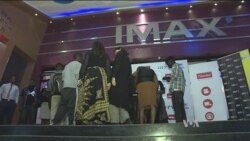A film festival in Kenya this month highlighted a group not often seen on the big screen: refugees. The festival, organized by the nonprofit group FilmAid in collaboration with Amnesty International, screened a selection of short films about exile and identity, some produced by refugees themselves.
One of the films showcased is “The Other Dadaab,” a five-minute documentary by Abdirisack Jama Shire on realities of the Dadaab refugee camp in northwestern Kenya.
The camp, near the Kenya-Somalia border, is the world’s largest refugee settlement with a population of close to 500,000 refugees.
The documentary showcases Dadaab as a virtual city with its own socio-economic dynamics as opposed to a transient settlement.
Mark Maina, the creator of another showcased film, “Neophobia,” was present for the screening of “The Other Dadaab.”
“I am really glad for FilmAid that they have closely shown us how it is, for those in the camps, the kind of lives they live, the suffering that they go through,” Maina said.
Understanding through film
FilmAid International is a nonprofit humanitarian group that uses movies and media to raise awareness of social issues.
It holds annual film festivals in Kenya to empower, inform and inspire refugees and other marginalized populations. This year’s screenings took place in the Dadaab and Kakuma refugee camps in addition to Nairobi.
Stella Suge is FilmAid’s country director.
“There are various things that we hope to achieve,” she said. One is that people can actually see the faces of refugees, which is largely presented as a statistic, so to encounter those faces and get a sense of who they are, their faces and their humanity and to share that. Secondly, we want to start to be in dialogue with Kenyan nationals who have actually been hosting refugees for a long time without a clear understanding of what it means ... and basically take a journey of starting to include refugees in our day-to-day life to give them a more humane, more normal and dignified life.”
‘We are all human’
Wambui Mumbi attended the screening at IMAX Cinema in Nairobi.
“The main lesson that I have picked [up] is that we should not segregate refugees,” Mumbi said. “We should not treat them like they are a different species because at the end of the day we are all humans. The struggles they go through are the same that we go through, are like the same things we go through.”
Pereshian Beth also attended the screening.
“It was educative, we got to learn more on how the refugees are living in Kakuma and in Daadab. They are doing something good for themselves … we need to empower them ... their story is their voice,” Beth said.
More films like “The Other Dadaab” may be on the way, as FilmAid programs train more than 50 refugees annually on filmmaking.





